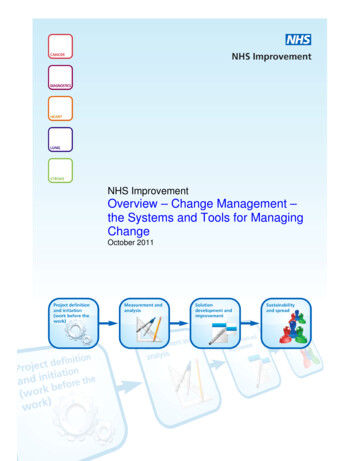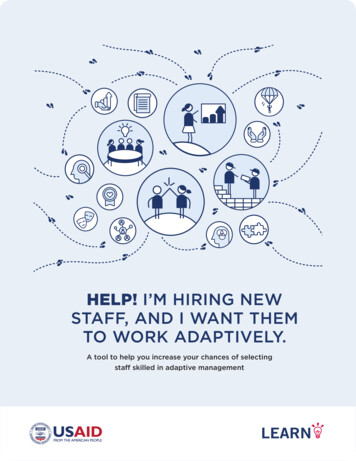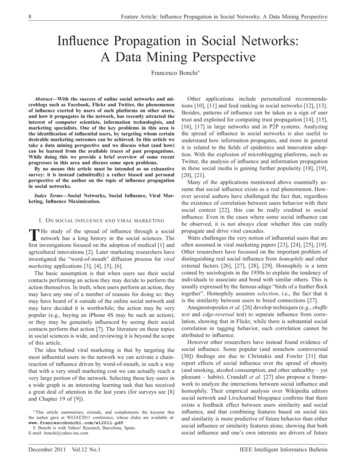
Transcription
International Journal of Humanities, Religion and Social ScienceISSN : 2548-5725 Volume 2, Issue 5, 2018www.doarj.orgTHE INFLUENCE OF CHANGE MANAGEMENT ANDORGANIZATIONAL CULTURE MEDIATED EMPLOYEECOMPETENCE ON THE IMPLEMENTATION OFGOVERNMENT REGULATION NUMBER 71 OF 2010CONCERNING GOVERNMENT ACCOUNTING STANDARDShela Fazri,1 Sri Wahyu Lelly Hana Setyanti,2 Dewi Prihatini21Postgraduate Program of Master of Management Studies Faculty of Economics and Business,University of Jember, Indonesia2Lecture Program of Master of Management Studies Faculty of Economics and Business,University of Jember, IndonesiaEmail correspondence: wedhuzpsr@gmail.comAbstract: Financial reporting based on accrual should be implemented by all governmententities by 2015 based on Government Regulation No. 71 of 2010. The strategy of changemanagement, the development of organizational culture and employee competence is needed inimproving the SAP (Standar Akuntansi Pemerintahan: Government Accounting Standards)implementation based on accrual on Government Regulation Number 71 of 2010. The purposeof this research is to analyze the effect of change management on employee competence,organizational culture influence to employee competence, influence of change managementtoward accrual-based SAP implementation, organizational culture influence to accrual-basedSAP application and employee competence influence to accrual based SAP application. Thisresearch is an explanatory research by testing hypothesis and analysis technique usedStructural Equation Modeling (SEM) method through AMOS program. The results show that themanagement of change and organizational culture has no effect on employee competence andthe accrual-based SAP implementation. However, employee competence has a significant andpositive effect on the accrual-based SAP implementation.Keywords: organizational culture, employee competence, management of change, accrual basedgovernment accounting standardsI.INTRODUCTIONGovernment Regulation Number 71 of 2010 on Government Accounting Standards(SAP) requires the financial reporting of government entities using accrual basis no later than2015 as set forth in the annex to the regulation. Accrual-based government accounting enablesgovernments to identify opportunities in using future resources and realize good management ofthese resources (Asfiansyah, 2015).1www.doarj.org
The Influence of Change Management and Organizational Culture Mediated EmployeeCompetence on the Implementation of Government Regulation Number 71 of 2010Concerning Government Accounting StandardRegional financial reports which are the end result of a qualified accounting processrequired human resources or personnel involved in the preparation of financial statements thatunderstand and have competence in the field of government accounting (Roviyantie, 2011).Research conducted by Arif (2015) also indicates that competence of human resources has apositive and significant relationship so that competence is one of the factors that affect thereadiness of Regulation implementation No. 71 of 2010. But some employees still do notunderstand accrual accounting system and procedures that can hamper the implementation ofSAP based on the accrual optimally. This condition is caused by several things such as theplacement of employees in positions not based on competence, especially in the field of regionalfinancial management and accounting.The resistance to changes from internal government agencies is a challenge that must befaced in the application of accrual-based SAP (Simanjuntak, 2010). Herlina’s research (2013)find that no discussion of the steps to be taken in applying accrual accounting standards willincrease the possibility of employee resistance to change is indicated by the reluctance ofemployees to adapt and competence in the new system. Therefore, change management will beneeded in optimizing the implementation of accounting standards based on accrual government.In addition, Soedjono (2005: 24) also argues that organizational culture can be the maincompetitive advantage instrument that is when organizational culture supports organizationalstrategy and when organizational culture can answer or address environmental challengesquickly and accurately. Therefore, the management of change strategy, the development oforganizational culture and the competence of employees is needed in improving the accrualbased SAP implementation based on Government Regulation No. 71 of 2010.II.2.1LITERATURE REVIEWAccrual-Based Government Accounting StandardsGovernment Regulation No. 71 of 2010 on Government Accounting Standards (SAP)requires the use of accrual accounting basis in local financial reporting. Accrual basis is the basisof accounting that admits the effect of transactions and other events at the time thetransactions/events occur regardless of when cash or equivalents are received or get paid. Someof the factors that influence the implementation of accrual-based government accounting are: a)The complexity of accounting systems and it based systems more complicated, b) Commitmentfrom the leadership, c) Availability of competent human resources and d) Resistance to changesfrom the internal organization (Ibrahim and Abdurrahman, 2013).The accrual-based SAP complexity can be seen from several important issues that arise inthe change of accounting standards in accordance with Government Regulation Number 71 of2010, Minister of Home Affair Regulation Number 64 of 2013 and Accrual-Based SAP Moduleare as follows.1. The principal financial statements that have to be compiled become increasingly so that thewhole financial statements include: a) Budget Realization Report, b) Report on Changes inthe Existing Budget Balance, c) Operational Report, d) Statement of Changes in Equity, e )Balance Sheet, f) Statement of Cash Flows and g) Notes to the Financial Statements.2. The accounting basis used is the accrual basis of accounting basis which acknowledges theeffect of transactions and other events at the time the transactions and events occurregardless of when cash or cash equivalents are received or paid.2www.doarj.org
The Influence of Change Management and Organizational Culture Mediated EmployeeCompetence on the Implementation of Government Regulation Number 71 of 2010Concerning Government Accounting Standard3.The existence of accounting policies that can be applied in the accounting process byaccounting entities, namely: a) Depreciation and amortization of assets, b) Recording andvaluation of inventories and c) Load recognition.2.2CompetenceCompetence is a skill and knowledge to perform activity/job/task. In addition,competence is an individual characteristic that underlies the performance or behavior within theorganization. A person’s performance will be influenced by knowledge, ability, attitude, workstyle, interests, trust and leadership style (Wibowo, 2011: 52).Competence is not an ability that can not be influenced, Zwell (2000: 56) reveals thatthere are several factors that can affect a person’s competence skills, namely a) Beliefs andvalues, b) Skills, c) Experience, d) Personal characteristics) Motivation, f) Emotional issues, g)Intellectual ability, and h) Organizational culture. In addition, Spencer and Spencer (1993) statethe five characteristics that make up the competence of a) knowledge, b) skills, c) self-conceptand values, d) personal characteristics, and e) motives.2.3Management of changeAccording to Potts and LaMarsh (2004: 16), Change Management is a systematic processof applying the knowledge, tools, and resources necessary to influence changes in people whowill be affected by the process. Sunyoto and Burhanuddin (2011) changes in the organizationthat is changing attitudes and work skills, work roles, technology and strategy. Change ofattitudinal involve values with persuasive appeal, training programs, team building and culturalchange programs. Changes with the focus of work skills can be done with job training programs.Working role change is done by redesigning employee work with different activities andresponsibilities, reorganizing workflow, changing criteria and so on. The approach in technologyis done by introducing new equipment in completing the work. While the strategy approach inchange demands consistent changes to individuals, work roles, and technology.According to Winardi (2004) the most frequent and prominent problem is "rejection ofchange itself". The most popular term in management is resistance to change. The rejection ofchange is not always obvious. The rejection can be in a form that is clearly visible (explicit) andimmediate, such as protesting, threatening strikes, demonstrations, and the others. Whilerejection is not visible (implicit), and running slowly, exemplified by loyalty to the organizationdiminishes, work motivation decreases, work errors increase, increased absent, and so on.2.4Organizational cultureRobbins (2002: 279) defines organizational culture as a system of shared meanings bymembers who differentiate organizations from other organizations. There are sevencharacteristics of organizational culture: a) Innovation and risk taking, b) attention to detail, c)Outcome orientation, d) People-oriented, e) Team-oriented, f) Aggressiveness, and g) Stability.In addition, Tan (2002) also revealed other organizational culture indicators that are a) Individualinitiative, b) Risk tolerance, c) Control, Management support, and e) Communication pattern(communication pattern).3www.doarj.org
The Influence of Change Management and Organizational Culture Mediated EmployeeCompetence on the Implementation of Government Regulation Number 71 of 2010Concerning Government Accounting StandardAccording to Cameron and Quinn (1999) mentions there are four types of organizationalculture:a. Bureaucratic culture, an organizational culture that emphasizes formalities, rules, roles,policies, procedures, chain of command and centralized decision making.b. Clan culture, a characteristic described by familial situations, traditional emphasis, loyalty,ritual, teamwork and strong social influences within the team organization.c. Entrepreneurial culture, a characteristic described by innovation, creativity, risk-taking andaggressiveness in seeking opportunities.d. Market culture, which is characterized by a character of measurable achievement anddepends on goals such as financial and market-based improvements.2.5Empirical StudyResearch conducted by Sugiarto (2014), Laksono (2016), and Dewi (2017) concludedthat the competence or quality of human resources has significant influence on the application ofaccrual-based SAP to government institutions. Organizational culture also has an effect on theadoption of accrual-based SAP as concluded in Najati (2016) and Sugiarto (2014) research. Inaddition, the existence of gaps or research gaps that provides different research results. Laksono(2016) and Astuti (2015) research gave results that organizational culture and competence didnot significantly affect the application of accrual-based SAP. Bilondatu (2015) also concluded inhis research that the level of understanding of the apparatus has no significant effect on theaccrual-based SAP implementation.III.METHODThis research is an explanatory research that explains the causal relationship and test thecorrelation between several variables through hypothesis testing or explanatory research(Singarimbun and Effendi, 1995: 256). The location of the research was conducted in LumajangRegency Government of East Java Province.The population of research is Head of Sub Division of Finance and Accounting Officerfrom 54 Organization of Regional Officerat Government of Lumajang Regency so population is108 people. The consideration of the population determination is based on the authority andresponsibility held by the position in the administration of financial management and thepreparation of financial statement of Regional Officer. Sampling research using census techniquethat is using all members of population as sample. Based on amount of population hence total ofrespondent in this research is counted 108 person.Sources of data used are primary data and secondary data. Methods in this study usingsurvey research methods usingquestionnaire. All obtained data will be counted using Likert scalewith a range of 5 values categoriesor scores. Exogenous variables in this study are managementof change and organizational culture and intervening variable is the competence of employeeswhile endogenous variable is the application of accrual-based SAP. Hypothesis proposed in thisresearch is as follows.H1: Change management has a significant and positive impact on employee competenceH2: Organizational culture has a significant and positive impact on employee competence4www.doarj.org
The Influence of Change Management and Organizational Culture Mediated EmployeeCompetence on the Implementation of Government Regulation Number 71 of 2010Concerning Government Accounting StandardH3: Change management has a significant and positive impact on the accrual-based SAPimplementationH4: Organizational culture has a significant and positive impact on the accrual-based SAPimplementationH5: Employee competence has a significant and positive impact on the accrual-based SAPimplementationStatistical analysis used in this study is an inferential statistical analysis used to test theresearch hypothesis that has been determined by using the sample data obtained. InferencealStatistics Method used is Structural Equation Modeling (SEM) using AMOS program.IV.RESULT AND DISCUSSIONThe research data collected based on the respondents’ answers in the questionnaireamounted to 104 out of 108 questionnaires distributed. Summary description of respondentcharacteristics can be seen in Table 1 as follows.Table 1. Description of respondent characteristicsCategorySexAgeLength of workEducationCharacteristicMenWomenTotal 25 Year25-35 Year 35 YearTotal 10 Year10-20 Year 20 YearTotalHigh SchoolDiploma 1-3S1/ Diploma centage39 %61 %100 %2%31 %67 %100 %31 %34 %35 %100 %28 %8%60 %4%100 %4.1Model EvaluationSEM estimation results in full model using AMOS program shown in Figure 1 asfollows.5www.doarj.org
The Influence of Change Management and Organizational Culture Mediated EmployeeCompetence on the Implementation of Government Regulation Number 71 of 2010Concerning Government Accounting StandardFigure 1. Result of full model estimationThe evaluation of the goodness of fit full model criteria in Figure 1 is summarized inTable 2 as follows.Tabel 2. Result of goodness of fit criteria evaluationNo.Goodness of fit index1.Cut-ofvalueValueResult 215,563241,668not fit 0.05 0.08 0.90 0.90 2.00 0.90 0.900,0020,0560,8270,7821,3210,9070,919not fitFitMarjinal fitTidak fitFitFitFitChi-square2.3.4.5.6.7.8.Sidnificaned ProbabilityRMSEAGFIAGFICMIN/DFTLICFIInfoNumber Chisquare 215,563with df 183Based on the evaluation results in Table 2 the model can be said not yet accepted as agood model because there are still some criteria of goodness of fit that have not been fulfilled.Then the model must also get a test of construct validity to determine the ability of indicator sizein reflecting the latent theoretical construct. The result of construct validity test can be seen inTable 3 as follows.6www.doarj.org
The Influence of Change Management and Organizational Culture Mediated EmployeeCompetence on the Implementation of Government Regulation Number 71 of 2010Concerning Government Accounting StandardTable 3. Test results of construct validityValidity ValueVariableManagementof ChangeOrganizational CultureEmployeeCompetenceImplementation of AccrualBased 0,7240,4110,3910,686InformationAVECR0,3500,680X3 and X5 notvalid/convergent0,4280,771X6 notvalid/convergent0,3720,734Z4 and Z5 notvalid/convergent0,5020,858All indicator arevalid/convergentThe data in Table 3 indicates there are some invalid indicators that require revision of themodel by excluding invalid indicators into the model. The revision model can be seen in Figure 2as follows after parameter estimation.Figure 2. Result of re-estimation of SEM revision model7www.doarj.org
The Influence of Change Management and Organizational Culture Mediated EmployeeCompetence on the Implementation of Government Regulation Number 71 of 2010Concerning Government Accounting StandardThe results of the evaluation of goodness of fit and the validity test of the revised modelconstruct shown in Figure 2 above are summarized in Table 4 and Table 5 as follows.Table 4. Evaluation result of the criteria of goodness of fit revision modelGoodness ofCut-ofNo.NumberValueInfofit indexvalue1.The value of Chi-squareChi-square 122,108 120,829Fit122,108 with df 982. Sidnificaned 0.050,059FitProbability3. RMSEA 0.080,048Fit4. GFI 0.900,873Marginal fit5. AGFI 0.900,824Marginal fit6. CMIN/DF 2.001,233Fit7. TLI 0.900,957Fit8. CFI 0.900,965FitTable 5. Result test of construct validity of model revisionValidity ValueIndicatVariableporCVAVECRX10,709Management ceZ3***0,687Implementationof Accrual-BasedY10,6840,5010,857SAPInfoAll indicator arevalid/convergentAll indicator arevalid/convergentAll indicator arevalid/convergentAll indicator arevalid/convergentTable 4 shows the results of a better model so as to meet the requirements of goodnessof fit, whereas Table 5 shows all the variable indicators have converged so as to reflect the latenttheoretical construct. The next evaluation to be done before hypothesis testing is the assumptionof SEM model that is evaluation of normality and outlier. The normality evaluation yields avalue of 1.70 and the value is below the cut of value of 2.58 which means the data is normallydistributed. Evaluation of the outlier assumption also shows that no observation results haveextreme values.Hypothesis testing can be done after evaluation of fit and assumption of SEM model hasbeen fulfilled. The results of hypothesis testing are summarized in Table 6 as follows.8www.doarj.org
The Influence of Change Management and Organizational Culture Mediated EmployeeCompetence on the Implementation of Government Regulation Number 71 of 2010Concerning Government Accounting StandardTable 6. Results of hypothesis testingVariableMANAGEMECOMOETENC --NT OFECHANGEORGANIZATICOMPETENC --ONALECULTURESAPMANAGEMEIMPLEMENT --NT OFATIONCHANGESAPORGANIZATIIMPLEMENT --ONALATIONCULTURESAPCOMPETENCIMPLEMENT cussion of Hypothesis Test ResultsHypothesis 1 explains that management of change has a significant and positive effect onemployee competence is rejected. This can happen because of frequent mutation of employeesboth between positions and between agencies that make education and training as a managementof change strategy to be in vain. Employees who replace the transferred officials often lack theknowledge and skills in completing the tasks to which they are assigned. Hypothesis 2 explainsthat organizational culture has a significant and positive effect on employee competency isrejected. Some employees consider their duties and responsibilities as routines that are annuallydone so that they lack awareness to improve their competence. Hypothesis 3 explains thatmanagement of change has a significant and positive effect on the accrual-based SAP applicationbeing rejected. The existence of a mutation of employees who do not pay attention to thecompetence of office also be the cause of hypothesis 3 rejected. In addition, information systemsthat still have many constraints are not an excuse for not implementing accrual-based SAP.Hypothesis 4 explains that organizational culture has a significant and positive effect onthe application of accrual-based SAP is rejected. The adoption of accrual-based SAP is onlyregarded as a routine administrative activity of local financial management making theobjectives and benefits of such accounting standards to be not achieved. Some employees, eventhe heads of agencies, do not have much attention to changes in government accountingstandards. Hypothesis 5 explains that employee competence has a significant and positive effecton the accrual-based SAP application accepted. This result is in line with the results of researchconducted by Sugiarto (2014), Laksono (2016), and Dewi (2017) concludes that the competenceor quality of human resources has a significant effect on the application of accrual-based SAP togovernment agencies. Ibrahim and Abdurrahman (2013) also revealed that competent humanresources are the factors affecting the implementation of accrual-based government accounting.9www.doarj.org
The Influence of Change Management and Organizational Culture Mediated EmployeeCompetence on the Implementation of Government Regulation Number 71 of 2010Concerning Government Accounting StandardV.CONCLUSSIONBased on the result of hypothesis testing, management if change and organizational culture haveno effect on employee competency and accrual-based SAP implementation in accordance withGovernment Regulation Number 71 of 2010. However, employee competence has a significant andpositive influence on the accrual-based SAP implementation. These results indicate the need for acomprehensive strategy in improving employee competence as well as strengthening change managementand organizational culture for the purpose and benefits of accrual-based SAP implementation can beachieved.REFERENCESArif, W. 2015. Analisis Faktor-Faktor yang Mempengaruhi Kesiapan Pemerintah Kota TanjungPinang dalam Implementasi PP Nomor 71 Tahun 2010 tentang Standar AkuntansiPemerintah.Skripsi. Tanjung Pinang: Universitas Maritim Raja Ali Haji.Asfiansyah, A. 2015.Strategi implementasi akuntansi akrual pada pemerintah daerah (studi kasuspada pemerintah kota “s”).Jurnal NeO-Bis. 9(1): 1-19.Astuti, I. Y. 2015. Pengaruh Kompetensi Aparat terhadap Implementasi Penerapan StandarAkuntansi Pemerintah Berbasis Akrual. Thesis. Gorontalo: Jurusan AkuntansiUniversitas Negeri Gorontalo.Bilondatu, T. 2015. Pengaruh Tingkat Pemahaman dan Pelatihan Aparatur Pemerintah DaerahTerhadap Penerapan Standar Akuntansi Pemerintahan (SAP) Berbasis Akrual dalamPengelolaan Keuangan Daerah.Skripsi. Gorontalo: Program Studi S1 AkuntansiUniversitas Negeri Gorontalo.Cameron, K. S. dan R. E. Quinn. 1999. Diagnosing and Changing Organizational Culture. USA:Addison-Wesley Publishing Company Inc.Dewi, L. D. S. 2017. Pengaruh Kualitas Sumber Daya Manusia, Komitmen Organisasi danSistem Pengendalian Intern terhadap Keberhasilan Penerapan SAP Berbasis Akrual.Skripsi. Singaraja: Program Studi S1 Akuntansi Universitas Pendidikan Ganesha.Ibrahim.P. dan Abdurahman. 2013. Overview Of Accrual Basic Academics Perspective. SeminarAkuntansi. Makassar: National 7th Hasanuddin Accounting Days. 21 Januari 2015.Laksono, L. M. P. 2016. Pengaruh Budaya Organisasi, Kompetensi Sumber Daya Manusia danProfesionalisme Aparat terhadap Kesiapan Penerapan PP 71 Revisi 2010.Skripsi.Surabaya: Program Studi Akuntansi Universitas Airlangga.Najati, I. 2016. Implementasi Akuntansi Berbasis Akrual : Pengujian Determinan danImplikasinya terhadap Kualitas Laporan Keuangan Kementerian/Lembaga. Tesis.Mataram: Magister Akuntansi Universitas Mataram.Potts, R dan J, LaMarsh. 2004. Managing for Succes. London: Duncan Baird Publisher.Robbins, S. P. 2002. Prinsip-Prinsip Perilaku Organisasi. Jakarta: Erlangga.Roviyantie, D. 2011. Pengaruh Kompetensi Sumber Daya Manusia dan Penerapan SistemAkuntansi Keuangan Daerah Terhadap Kualitas Laporan Keuangan Daerah (Surveipada Organisasi Perangkat Daerah Kabupaten Tasikmalaya).Skripsi.Bandung:Universitas Siliwangi.Simanjuntak, B. H. 2010. Penerapan Akuntansi Berbasis Akrual di Sektor Pemerintahan diIndonesia.Makalah Orasi Ilmiah. Jakarta: Kongres XI Ikatan Akuntan Indonesia. 9Desember.10www.doarj.org
The Influence of Change Management and Organizational Culture Mediated EmployeeCompetence on the Implementation of Government Regulation Number 71 of 2010Concerning Government Accounting StandardSingarimbun, M. and S. Effendy. 1995. Metodologi Penelitian Survei. Jakarta : LP3S Indonesia.Soedjono. 2005. Pengaruh budaya organisasi terhadap kinerja organisasi dan kepuasan kerjakaryawan pada terminal penumpang umum di surabaya. Jurnal Manajemen &Kewirausahaan. 7(1): 22- 47.Spencer, L. M. dan S. M. Spencer. 1993. Competence at Work: Model for SuperiorPerformance. New York: John Wiley and Sons Inc.Sugiarto, E. S. 2014. Faktor-Faktor Pendukung atas Keberhasilan Penerapan Akuntansi BerbasisAkrual pada Pemerintahan di Kota Solo.3rd Economic & Business Research Festival. 13November. Fakultas Ekonomika dan Bisnis Universitas Kristen Satya Wacana: 17131726.Sunyoto.D. and Burhanuddin. 2011. Perilaku Organisasional. Jakarta : PT. Buku Seru.Tan, V. S. L. 2002. Changing Your Corporate Culture. Singapore: Times Books International.Wibowo. 2011. Manajemen Kinerja. Jakarta: PT Rajagrafindo Persada.Winardi, J. 2004. Manajemen Perilaku Organisasi. Jakarta: KencanaZwell, M. 2000. Creating A Culture of Competence. New York: John Wiley and Sons Limited11www.doarj.org
The Influence of Change Management and Organizational Culture Mediated Employee Competence on the Implementation of Government Regulation Number 71 of 2010 Concerning Government Accounting Standard 2 www.doarj.org Regional financial reports which are the end result of a qualified accounting process required human resources or personnel involved .



![Change Management Process For [Project Name] - West Virginia](/img/32/change-20management-20process-2003-2022-202012.jpg)







